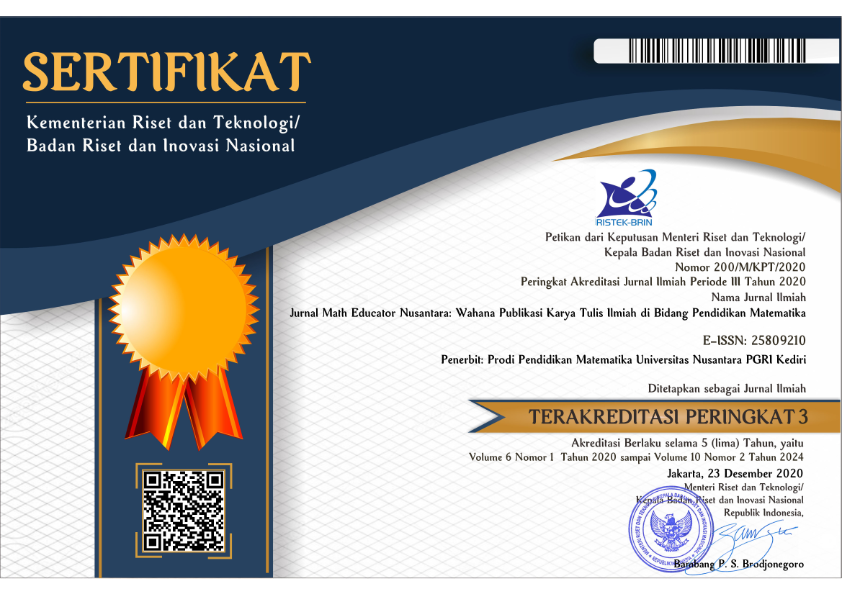Meta-Analysis of investigation of the flipped classroom model on students' high order thinking skills (HOTS) mathematics: Analysis of combined effects and heterogeneity
DOI:
https://doi.org/10.29407/jmen.v10i1.22296Keywords:
HOTS of mathematics, meta-analysis, flipped classroom modelAbstract
Penelitian ini bertujuan untuk menguji keefektifan model flipped classroom terhadap kemampuan berpikir tingkat tinggi (HOTS) siswa pada mata pelajaran matematika. Metode penelitian menggunakan meta-analisis. Sampel dalam penelitian ini adalah 18 penelitian primer yang memenuhi kriteria inklusi yang ditentukan. Analisis data dilakukan dengan menggunakan perangkat lunak meta-analisis komprehensif (CMA). Hasil analisis menggunakan pendekatan random-effect menunjukkan bahwa effect size gabungan adalah (g = 1.82; p < 0.01) (Efek sangat Besar). Hal ini menunjukkan bahwa penerapan model flipped classroom memberikan pengaruh yang besar terhadap HOTS matematika siswa jika dibandingkan dengan model pembelajaran tradisional. Hasil analisis variabel moderator menunjukkan bahwa pengaruh penerapan model flipped class terhadap HOTS matematika siswa berbeda secara signifikan berdasarkan variabel tipe publikasi (Qb = 7.94; p = 0.01). Namun tidak berbeda nyata berdasarkan variabel tingkat pendidikan (Qb = 7.45; p = 0.06), kapasitas kelompok eksperimen (Qb = 0.29; p = 0.62), dan tahun publikasi (Qb = 0.21; p = 0.64). Temuan-temuan tersebut dapat menjadi dasar pemilihan model pembelajaran matematika sehingga kualitas pembelajaran matematika dengan menggunakan model flipped classroom dapat ditingkatkan
References
Alfina, N. S., Elidra, R., & Harahap, M. S. (2021). Efektivitas penggunaan model pembelajaran flipped classroom terhadap kemampuan berpikir kritis matematis siswa di SMA Negeri 1 Angkola Barat. JURNAL MathEdu (Mathematic Education Journal), 4(1), 97-106.
Altakhayneh, B. (2022). Impact of Using Flipped classroom Strategy in Developing the Mathematical Thinking of Pre-Service Teachers in Open Education Systems in Jordan. International Journal of Emerging Technologies in Learning, 17(3), 228–244. https://doi.org/10.3991/ijet.v17i03.24973
Andriani, D. (2019). Pengaruh Model Flipped classroom terhadap Kemampuan Representasi Matematika Ditinjau dari Curiosity Belajar Matematika Peserta Didik. (Skripsi Universitas Islam Negeri Raden Intan Lampung).
Apino, E., & Retnawati, H. (2017, February). Developing instructional design to improve mathematical higher order thinking skills of students. In Journal of Physics: Conference Series (Vol. 812, No. 1, p. 012100). IOP Publishing.
Ariani, D. N., Sumantri, M. S., & Wibowo, F. C. (2022). The Impact of Android Module-Based Inquiry Flipped classroom Learning on Mathematics Problem Solving and Creative Thinking Ability. International Journal of Interactive Mobile Technologies, 16(24), 32–46. https://doi.org/10.3991/ijim.v16i24.35749
Badawi., Sumarno., Hukom., J, Prihatmojo, A., Manaf, A, Suciati, I., Ratau, A. (2023). Integration of Blended Learning and Project-Based Learning (BPjBL) on Achievement of Students’ learning goals: A Meta-analysis study . Pegem Journal of Education and Instruction, 13(4), 274–281. https://doi.org/10.47750/pegegog.13.04.32
Borenstein, M., Hedges, L. V, & Rothstein, H. R. (2009). Introductionto Meta-Analysis (Issue January).
Cheng, L., Ritzhaupt, A. D., & Antonenko, P. (2019). Effects of the flipped classroom instructional strategy on students’ learning outcomes: a meta-analysis. Educational Technology Research and Development, 67(4), 793–824. https://doi.org/10.1007/s11423-018-9633-7
Chimmalee, B., & Anupan, A. (2023). the Effects of Using Flipped Cloud Learning With Advancing Mathematical Thinking Approaches on Undergraduate Students’ Mathematical Critical Thinking. Turkish Online Journal of Distance Education, 24(3), 240–260. https://doi.org/10.17718/tojde.1125894
Cohen, L., Manion, L., & Morrison, K. (2017). Research Methods in Education. Routledge.
Davies, P. (2000). The relevance of systematic reviews to educational policy and practice. Oxford Review of Education, 26(3-4), 365-378
Samal, D., Hartono, H., Widodo, E., Asih, R. A, Hukom, J., Belatu, S. (2024). Evaluation Of Blended Learning-Based Utilization Using CSE-UCLA Model. Pegem Journal of Education and Instruction, 14(2), 131-139. https://doi.org/10.47750/pegegog.14.02.16
Güler, M., Kokoç, M., & Önder Bütüner, S. (2023). Does a flipped classroom model work in mathematics education? A meta-analysis. Education and Information Technologies, 28(1), 57–79. https://doi.org/10.1007/s10639-022-11143-z
Ha, A. S., O’Reilly, J., Ng, J. Y., & Zhang, J. H. (2019). Evaluating the flipped classroom approach in Asian higher education: Perspectives from students and teachers. Cogent Education, 6(1), 1638147.
Hanifah, M., Ishartono, N., Halili, S. H. B., & Razak, R. B. A. (2023, June). Improving secondary school student’s mathematics critical thinking in geometry transformation through GeoGebra-Based flipped learning: An experimental study. In AIP Conference Proceedings (Vol. 2727, No. 1). AIP Publishing. https://doi.org/10.1063/5.0141401
Inayah, S., Septian, A., & Komala, E. (2021). Efektivitas Model Flipped classroom Berbasis Problem Based Learning dalam Meningkatkan Kemampuan Berpikir Kritis Mahasiswa. Wacana Akademika: Majalah Ilmiah Kependidikan, 5(2), 138-144.
Jdaitawi, M. (2020). Does Flipped Learning Promote Positive Emotions in Science Education? A Comparison between Traditional and Flipped classroom Approaches. Electronic Journal of e-learning, 18(6), 516-524.
Kamsurya, M. A., Wijaya, A., Ramadhani, R., & Hukom, J. (2022). The Effect of Self-Efficacy on Students’ Mathematical Abilities: A Meta-Analysis Study. Jurnal Pendidikan Progresif, 12(2), 451-463.
Khoirotunnisa, A. U., & Irhadtanto, B. (2020). Pengaruh Model Pembelajaran Flipped classroom Tipe Traditional Flipped Berbantuan Video Terhadap Kemampuan Berpikir Kreatif Siswa pada Materi Bangun Ruang Sisi Datar. Jurnal Pendidikan Edutama, 7(2), 17-23
Kiptiyah, S. M., Purwati, P. D., & Khasanah, U. (2021). Implementasi Flipped classroom Bernuansa Etnomatematika Untuk Meningkatkan Kemandirian Belajar Dan Kemampuan Literasi Matematika. Jurnal Pendidikan Matematika Universitas Lampung, 9(3), 318–332.
Limniou, M., Schermbrucker, I., & Lyons, M. (2018). Traditional and flipped classroom approaches delivered by two different teachers: the student perspective. Education and Information Technologies, 23, 797-817.
Martaputri, N. A., Muhtadi, A., Hukom, J., & Samal, D. (2021). The Correlation between Emotional Intelligence and Academic Achievement: A Meta Analysis Study. Jurnal Pendidikan Progresif, 11(3), 511-523.
Metpattarahiran, C. (2023). Effect of implementing instruction based on flipped classroom approach on critical thinking and attitudes toward mathematics of fourth-year undergraduate students in mathematics teacher preparation program, faculty of science and technology, suan dusit un. Journal of Multidisciplinary in Social Sciences, 15(3), 62–69.
Muhtadi, A., Assagaf, G & Hukom, J. (2022). Self-efficacy and students’ mathematics learning ability in Indonesia: A meta analysis study. International Journal of Instruction, 15(3), 1131- 1146.
Muhtadi, A., Pujiriyanto., Syafruddin, K., Hukom, J., & Samal, D. (2022). A meta-analysis: Emotional intelligence and its effect on mathematics achievement. International Journal of Instruction, 15(4), 745-762.
Mullen, B., Muellerleile, P., & Bryant, B. (2001). Cumulative metaanalysis: A consideration of indicators of sufficiency and stability. Personality and Social Psychology Bulletin, 27(11), 1450– 1462.
Nguyen, A. T. T., Thanh, H. N., Minh, C. Le, Tong, D. H., Uyen, B. P., & Khiem, N. D. (2023). Combining flipped classroom and GeoGebra software in teaching mathematics to develop math problem-solving abilities for secondary school students in Vietnam. Mathematics Teaching-Research Journal, 15(4), 69–97.
Nida, N. K., Usodo, B., & Saputro, D. R. S. (2020, May). Effectiveness of the flipped classroom model on the students’ mathematical creative thinking skills. In International Conference on Online and Blended Learning 2019 (ICOBL 2019) (pp. 107-110). Atlantis Press. https://doi.org/10.2991/assehr.k.200521.022
Nurfadillah, L., Santosa, C. A. H. F., & Novaliyosi, N. (2020). Pengaruh Model Pembelajaran Flipped classroom Terhadap Kemampuan Berpikir Kritis Matematis Siswa. Wilangan: Jurnal Inovasi Dan Riset Pendidikan Matematika, 1(2), 215-225.
Palinussa, A. L., Laamena, C., & Mananggel, M. B. J. D. (2021). Development of learning models flipped classroom to increase the mathematical Higher Order Thinking Skills (HOTS) of students in high school. Development, 63(03).
Purnomo, B., Muhtadi, A., Ramadhani, R., Manaf, A., & Hukom, J. (2022). The effect of flipped classroom model on mathematical ability: A meta analysis study. Jurnal Pendidikan Progresif, 12(3), 1201-1217.
Samritin, S., Susanto, A., Manaf, A., & Hukom, J. (2023). A meta-analysis study of the effect of the blended learning model on students’ mathematics learning achievement. Jurnal Elemen, 9(1), 15-30. https://doi.org/10.29408/jel.v9i1.6141
Setiawan, A. A., Muhtadi, A., & Hukom, J. (2022). Blended learning and student mathematics ability in Indonesia: A meta-analysis study. International Journal of Instruction, 15(2), 905-916.
Situmeang, R., Elindra, R., & Harahap, M. S. (2021). Efektifitas Penggunaan Model Pembelajaran Flipped Clasroom Terhadap Kemampuan Berpikir Kreatif Matematika Siswa Di Kelas Viii Smp Negeri 9 Padangsidimpuan. JURNAL MathEdu (Mathematic Education Journal), 4(2), 278-284.
Sulistyowati, E., Hukom, J., & Muhtadi, A. (2023). Meta-Analysis of Flipped classroom on Students’ Mathematics Abilities: Effectiveness and Heterogeneity Analysis. JTP - Jurnal Teknologi Pendidikan, 25(2), 140-159.
Supriadi, N., Man, Y. L., Pirma, F. O., Lestari, N. L., Sugiharta, I., & Netriwati. (2021). Mathematical reasoning ability in linear equations with two variables: The impact of flipped classroom. IOP Conference Series: Earth and Environmental Science, 1796(1). https://doi.org/10.1088/1742-6596/1796/1/012022
Tabieh, A. A. S., & Hamzeh, M. (2022). the Impact of Blended-Flipped Learning on Mathematical Creative Thinking Skills. Journal of Educators Online, 19(3). https://doi.org/10.9743/JEO.2022.19.3.15
Tambunan, H. (2019). The Effectiveness of the Problem Solving Strategy and the Scientific Approach to Students' Mathematical Capabilities in High Order Thinking Skills. International electronic journal of mathematics education, 14(2), 293-302.
Vitta, J. P., & Al-Hoorie, A. H. (2023). The flipped classroom in second language learning: A meta-analysis. Language Teaching Research, 27(5), 1268–1292. https://doi.org/10.1177/1362168820981403
Vo, H. M., Zhu, C., & Diep, N. A. (2017). The effect of blended learning on student performance at course-level in higher education: A meta-analysis. Studies in Educational Evaluation, 53, 17-28.
Wagner, M., Gegenfurtner, A., & Urhahne, D. (2020). Effectiveness of the flipped classroom on student achievement in secondary education: a meta-analysis. Zeitschrift Für Pädagogische Psychologie, 35(1), 11–31. https://doi.org/10.1024/1010-0652/a000274
Wei, X., Cheng, I. L., Chen, N. S., Yang, X., Liu, Y., Dong, Y., Zhai, X., & Kinshuk. (2020). Effect of the flipped classroom on the mathematics performance of middle school students. Educational Technology Research and Development, 68(3), 1461–1484.
Widana, I. W., Parwata, I., & Sukendra, I. K. (2018). Higher order thinking skills assessment towards critical thinking on mathematics lesson. International journal of social sciences and humanities, 2(1), 24-32.
Yakar, Z. Y. (2021). Ters Yüz Öğrenme Modelinin İlk ve Ortaöğretim Öğrencilerinin Matematik Başarısına Etkisi: Bir Meta Analiz Çalışması. In Çukurova Üniversitesi Eğitim Fakültesi Dergisi (Vol. 50, Issue 2). https://doi.org/10.14812/cufej.865337
Yakar, Z. Y. (2021). The Effect of Flipped Learning Model on Primary and Secondary School Students' Mathematics Achievement: A Meta-Analysis Study. Çukurova Üniversitesi Eğitim Fakültesi Dergisi, 50(2), 1329-1366.
Yohannes, A., & Chen, H.-L. (2024). The effect of flipped realistic mathematics education on students’ achievement, mathematics self-efficacy and critical thinking tendency. Education and Information Technologies, 1–27. https://doi.org/10.1007/s10639-024-12502-8
Yurniwati, Y., & Utomo, E. (2020, October). Problem-based learning flipped classroom design for developing higher-order thinking skills during the COVID-19 pandemic in geometry domain. In Journal of Physics: Conference Series (Vol. 1663, No. 1, p. 012057). IOP Publishing.
Downloads
Published
Issue
Section
License
Authors who publish with this journal agree to the following terms:
- Copyright on any article is retained by the author(s).
- The author grants the journal, the right of first publication with the work simultaneously licensed under a Creative Commons Attribution License that allows others to share the work with an acknowledgment of the work’s authorship and initial publication in this journal.
- Authors are able to enter into separate, additional contractual arrangements for the non-exclusive distribution of the journal’s published version of the work (e.g., post it to an institutional repository or publish it in a book), with an acknowledgment of its initial publication in this journal.
- Authors are permitted and encouraged to post their work online (e.g., in institutional repositories or on their website) prior to and during the submission process, as it can lead to productive exchanges, as well as earlier and greater citation of published work.
- The article and any associated published material is distributed under the Creative Commons Attribution-ShareAlike 4.0 International License















